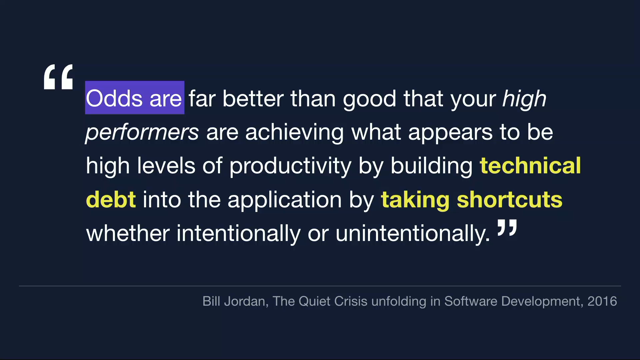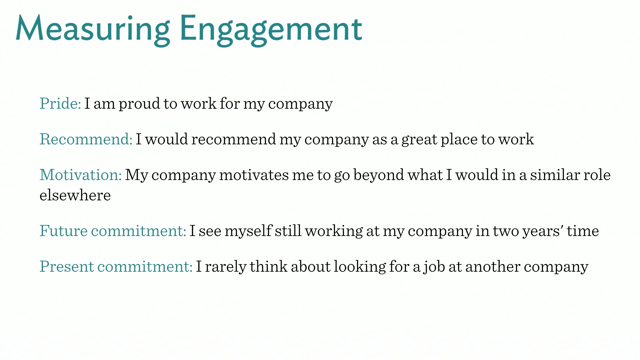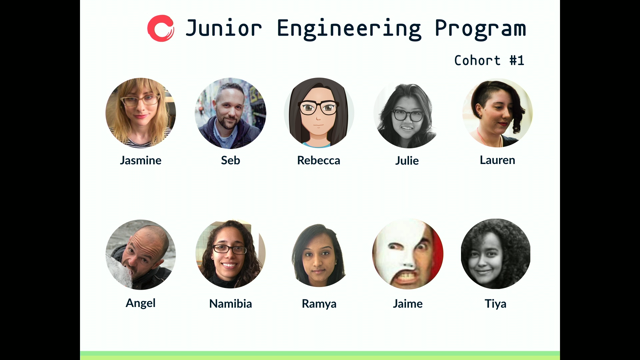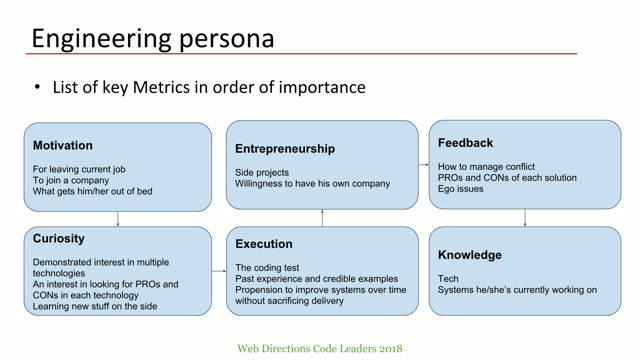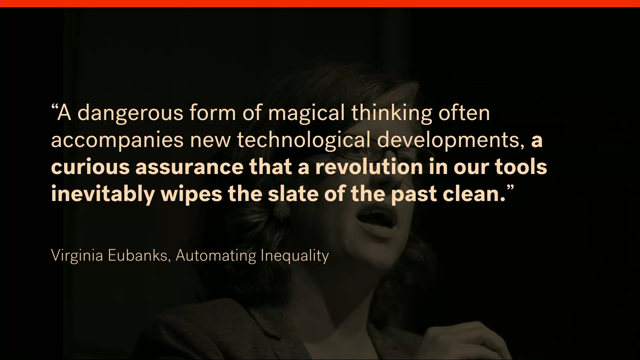From Tech Lead to Motherhood: one woman’s journey from changing systems to changing nappies, and back again

(upbeat electronic music) - Hi, I'm Sarah Taraporewalla and I'm a software consultant at ThoughtWorks. And I've been there for the last 12 years.
I joined them as a developer.
I grew into tech leadership but more often these days I'm doing software architecture or coaching CTOs, CIOs. I'm also a mum of three children.
How did I get there and what am I doing today to let me come back to the work I would like to share with you.
Now, granted, a conference aimed at CTOs isn't necessarily going to be the target audience for telling another woman about a journey and how they can get there. But it's the people that are in this room that can have the most significant difference as to whether a woman's journey into motherhood and her return back into the workforce is smooth and sailing and successful.
Or whether they get turned off from either motherhood or a career.
I want to acknowledge the part that my company though has played in my journey. So I've been there for 12 years so, it's pretty much the only place I've known for a very, very long time.
About six years ago we decided to make a conscious effort to improve the diversity figures within our company. So, six years ago we set targeted and deliberate quotas on all grads coming in. There had to be a one-for-one hire.
So for every male grad that entered our company there was a female that came in with it.
Today and I just did this dump of our professional services, consultant base in Australia, we're at 39% females, 60% males and if you notice that doesn't add up to a hundred because we've also just recently started to acknowledge the other underrepresented minority group.
And we've got a few hires in Australia that identify within that group.
As a result, we've won quite a few awards, we've been certified with The Workplace Gender Employer of Choice in Australia. We've also been given quite a few awards from the Anita Borg Institute in America.
This is to say that anyone can do this.
It's not just unique to my role, it's not just unique to ThoughtWorks but it is unique to a company who's actually motivated and wants and to incentivize to change the way that we work. So, question.
When did you first worry about how children would impact your career? Was it the drive home from the hospital with your wee bub in the back? Was it during the prenatal class? Was it when you decided to have a family with your partner? For me and for a lot of women that I know it started before we had even graduated university. So, think about that.
For the whole of my career one thought, one persistent thought I had in my head, was when I have children what would I do.
That was a guiding influence on the first part of my career.
So before I had children, before I was even ready to start a family my goal was to get as far as quickly as I could through the ranks of my company.
To become a tech lead before I decided to leave my industry for good. I would have left it had I not had some mentors and some guiding conversations with a few key people in my life including my father who told me to go talk to my mother who was a stay at home mum to see whether she would also advise me to just take a long time off or whether to continue with working.
Her advice was to come back but come back part time. So, with that in mind I figured that all right, I could stay here a little bit longer. I'll not only go to tech lead but I'll keep on going and keep on working. And I'll just try and work at and discover how I could do it.
Because when I looked around my company and when I looked around industry as a general I was faced with two options.
One of them which is fantastic females shown as great examples of women in tech.
My own CTO Rebecca Parsons was one of these women that was shown to me as an example of someone who can get so far in tech.
Unfortunately for her her story didn't resonate with me because she has not got children.
So, I couldn't see how she could get to there. I don't know whether she got to there because at the sacrifice of a family, whether she didn't want the family.
But to me I want a family, I have a family. So, how do I continue? How do I get there? One of the things that you can do right from the beginning is have a very strong and supportive parental leave policy. It's no good working out what your maternity leave policy is when you get an employee to come to you and say: I'm pregnant.
This is actually an example of my friend who worked for a global software company basically wrote her maternity leave herself because there wasn't one in place.
So, this is what I think, this is what my company does. And this is what is on trend with what good looks like at the moment.
So, my company's given me 18 weeks full paid leave. Take up to two years of leave.
So, the rest of that unpaid.
During that unpaid portion I still get SUFA and I still get my benefits.
So, all of that stuff has carried through.
There're probably other, even better things that are out there.
But the most important thing is continually review them and continuing to look at how we can better them. Touching base during maternity leave is also really important and key to the successful re-entry. So, being allowed to come to company events, being invited to them, not being excluded from key emails, having my laptop so I can actually keep in touch when I want to. So, that's the other key thing.
There's a little bit of a difference between saying: We've got all these emails but then you also need to give the freedom to the new mother to say: You can check out for the next 12 months.
You don't need to come back, you don't need to talk to us. If you want to come.
There's a standing invitation to all Friday lunches, to come along, bring your children, don't worry. There's a standing invitation to all events, to come along. And we've also just had an event in the office on the weekend where it was like a mini conf at our office. We organised childcare for anyone who needed it. So that anyone, fathers or mothers could bring their children and get involved with the event at no worries. I'd also like to let you know about keep in touch days. This was new to me for, my youngest is 15 months. So, I've recently rejoined again.
And I never knew about keep in touch days.
But there's this thing that the government has suggested where it's if you would like to come back to the office just to get reacquainted, find out what's happening in your role and understand a little bit about the work you can get paid for up to 10 days.
And I took advantage of a couple of them in keeping in touch and keeping ready when I was doing some conference speaking at the end of last year.
Here's the kicker.
There is no good in having a great maternity leave policy if you're supporting parent policy doesn't match.
If you don't give equal access to the men as well as to the women in my opinion you're just paying lip service to women. A supportive environment, an inclusive environment includes everybody. So, how can you do that? Change the language of your policies.
Don't call it maternity or paternity.
Call them parental leave.
Talk about primary carers and secondary carers. Allow the men who are not traditionally the people to take these policies allow them the support and the space to actually volunteer to go into that primary care role. Did you know that in Sweden the government mandates about three months for the fathers to also take. They provide it in the legislation to say: You can go take this time off.
More than that, if you haven't taken that time off and you try and get a new job you have to explain during the interview: Why did you not take the three months off to support your family to be with you child? It is that ingrained within the culture that there is now expected that the parent, the fathers take off just as much time as the mothers. So, be equal access.
Want for more women in our industry will only happen when we also start giving benefits to the father role in our companies. I'd like to talk a little bit about the fears that I had when returning back. And some of the obstacles that were presented to me and how I overcame them, what I've done differently. So, there are four different areas.
The first one is technology changes.
If you speak to anybody, any female one of their biggest fears and biggest challenges regardless of industry, regardless of the type of work that they do, regardless if they are a full time employee on a product or if they're an employee on a consultancy is that the technology changes too quickly for us to keep up.
Adapting to part time.
So, as I said I balancing going back to work by actually only working part time.
So, I wanna talk to you a little bit about this 'cause this is my biggest challenge that I've had returning to work.
Career advancement.
How do I make sure that I'm always advancing towards my career? And adjusting back.
So, that's the immediate months after I'm coming back into work.
What are the fears, what are the challenges? So, I wanna start by looking at technology changes. The fact that technology does change so quickly is one of the reasons that I decided to only take a year out of work.
But even within a year I was so surprised about how many changes happened within that year. When I came back I think the second time we were knee deep into the Angular/React battle. Now, when I went away jQuery was still the JavaScript language that I chose. So, it happens and it happens even within the year. So, what are we gonna do about it? So, the first thing that I thought about is: How do I learn? I had to have a look at about how I learn.
The most important way that I personally learn is on the job so, as a software consultant, as an Agile company we do lots of pairing.
So, pairing, working with someone always on stories. And pairing proved to me one of the easiest ways for me to overcome any of the technology battles. I would sit down with my pair and say: We've gotta do this story.
And I don't know how to do it in React.
But I will tell you exactly how I will do it in any other language.
I will write down the Studio code that I'd like to do. So, I did that and then they actually showed me how to turn that into React code.
And every time I did that I picked up just little bits and little snippets about React until eventually I was a bit more comfortable with it. Having the amount of work reduce so that you're only working on small stories helps with working out the specific problems that you're having with picking up a new language. So, smaller batches means easier for you to maybe do repetitive tasks or you to just not needing to overcome so much as you're learning a new language.
This isn't new or this isn't unique, sorry to someone coming back from motherhood.
This is just: How do I pick up a new language? I also found working, having a strong foundation. And just relying on: Well, in my old day I used to do it like this. And getting the youngsters in my team to show me the new way.
It actually helped bridge that gap.
I also found when I would get on my soapbox and do the in my old day rants there's a couple of, the ways that the new technologies were shaping up the way that some of the metaphors that we're introducing. And we started to challenge why frameworks presented things in different ways.
So, we, the youngsters also were able to learn a little bit more about the technology and where it's come from.
I've also done some Udemy courses.
So, I wanted to learn a little bit more about stop being a hand wavy and learn a little bit more about AWS and be a bit more practical around it.
Because I hadn't been able to do that to date. So, I've been at home following some Udemy courses. I'm finding it very challenging though just to get the time and the head space to get into that to do some of the work.
For me, on the job is far more productive.
But I think I've always found that.
And the other place I wanna, thing I wanna mention is I've just recently found this term, I love it: Returnships. So, it's not an internship but it's a returnship. M-Y-O-B, I don't know if they're represented here today but they've got a fantastic developer programme. So, anyone looking to come back into the industry can do this internship where they give you mentors and they guide you through new learnings.
We run a back to work programme in India where we just we take you through a full week bootcamp. Coder Academy it's also a similar organisation where it's just a bootcamp that you can go to to upskill. During these courses it's more than just learning the skill it's also becoming more confident and believing that you have something to value again. Confidence boosting is one of the most significant side effects of these courses 'cause it can be, if you're feeling very vulnerable when you're just coming back from work having this place, this safe place to fill, to gain your confidence can mean that when you're actually join back properly you hit the ground running.
So, for me when I came back I came back part time. When I came back part time I think there was only one other person in my company that was working part time.
So, I had to work out how to do it, how to make it apply.
I'm proud to say that we've actually got 25 part timers working across Australia.
And those part timers aren't just the mothers they're also the fathers.
So, the more people that we had, the more examples to show everyone else that we could be part time, the more other people decided that they would actually like to redress their work/life balance.
So, part time in my company can range quite a few different things.
On one end of the scale we've got a few of the fathers who take one day a fortnight off.
And then we've, the next sort of scale down we've got four day a weekers.
A lot of people working three days a week.
And me flying solo at only two days a week. Two days a week at doing a job is extremely challenging. In fact, the first thing that I learned is that part time work does take a lot of effort, a lot more effort than you might initially think. It's not if I work two days a week I'm not just doing 40% of work.
There is a significant overhead.
And in fact at two days I found that I needed to redefine my role.
When I came back no one was doing part time. I had to work it out.
I had to experiment.
As a consultant I had the freedom to do a piece of work and then within a couple of weeks roll off and do another piece of work.
So, that allowed me the opportunity to experiment and experiment rapidly and quickly with a couple of different roles that I could actually do. I found that teamwork where I was included and I had to keep abreast of anything that was happening on a context, any changes that happened with a context to be extremely difficult for me.
And I found that when I could own the work when I had a little bit more of an advisory position where the ground under me didn't shift every time I came back into the office those types of gigs were far easier for me and far more comfortable for me.
And they made me more productive.
So, instead of doing a lot more work within teams I stood back from the tech lead role.
I stood back from developing.
And I moved more into advisory.
So, that's how I actually moved more into the architecture and coaching CTO because these types of activities, long running and they don't change dramatically. Other people in my company found that they just do less. So, they were able to take their role and just do a little bit less.
But it was at that three to four day mark that they found to be challenging.
So, a person doing four days a week can quite comfortably squeeze in slightly less work. At that three day they found it a little bit challenging. For me it's impossible to continue to do the work that I was doing before. And because of this overhead, because of this context switchin' that you have to gain, imagine if you were taking a sick day every couple of days. When you came back how much would change.
Now, if you're just taking the one off sick day it's very easy for you to get acclimatised and understand things that are happening, conversations that have happened when you just get back to work.
But there's a lot of effort that I do to go to part time. And that's a lot of out of hours work.
If you are a leader I would encourage you to think about and recognise how much out of hours part timers take. 'Cause communication and understanding that context of conversations that happen when your not there actually starts to shift how you start communicating within your teams. A lot of the practises from a remote first or distributed work really well for part timers because you start to document things a little bit more, you start using your chat channels a little bit more. And you start relying less on face to face communication. So, explore some of the different communication channels that are available.
But most important be an empathetic leader. Think about the part timer that you have in the team, what challenges the might be facing.
And be proactive because there's a lot of guilt associated with being a part timer.
And share, if you are part time share your experiences with the team because the team can help you overcome them. One of my biggest fears, one of my fears that I had was that my career would start to stall.
When I went on maternity leave I assumed that I'd just hit pause with my growth. The thing that I found out though is that as a human I kept on growing.
In fact, motherhood was a unique training ground for me to establish resilience, empathy, listening skills, persuasion, operating without sleep. And these are all skills that we should be cultivating and value and recognising within our organisations. I was surprised to find in the course of the last round of maternity leave I was given a pay rise three times because they kept on recognising that where I was was no longer matching where my peer and cohort group were. So, I was put through the pay review cycle and given a pay rise when I was up for maternity leave. I thought that was pretty fantastic.
Because my managers understand that growth doesn't pause and that there is so much more skills that could be learned during the paternity leave. But also and most significantly that the gender pay gap which is 14.5, nine percent, six percent at the moment is one of the biggest causes is because people don't get pay rises during this time off. And that it is very difficult for you to get back into your peer cohort group when you did only recognise technical skills. There comes a time though you need to start balancing priorities.
You can't just go on drivers all the time.
And one of the most difficult things I've had to accept is that it's okay and look at the bigger picture. My kids are only going to be little for a certain amount of time.
And as long as I'm making movements in the sand year on year overall I will get to where I need to go.
So, most importantly don't shy away from opportunities. If there is an opportunity that fits with where you wanna go with your career take it and figure out the details.
When I was on maternity leave I was given the opportunity to go to London and do a training course over there. I was given it by my leaders.
They said: Sarah, we know you're on maternity leave but this course is so good for you would you like to take it? I thought about it long and hard.
If I wasn't on maternity leave that was the next thing that needed to progress my career.
And so, I was so grateful that they gave me the opportunity they didn't just knock me off because I was on maternity leave.
They gave it to me like they would anyone else. I turned the opportunity down because my baby was only 12 weeks old at the time. And I just couldn't manage the challenges, the logistical challenges.
But they said: That's fine, we're gonna run it again in a couple a years time.
Sorry, not a couple years.
The next time that we run it you can be on it. We'll still give you the opportunity.
So, as a leader don't knock someone out because of what you think are there challenges. Give it to them.
After you give it to them.
Work with them to overcome them.
At this point I wanna really acknowledge the organisers of this conference John and also Rose who helped me come here today. I've got my baby sitting at the hotel room being minded by a child carer because I can't come to Melbourne from Brisbane without her. But I worked with them and they were very accommodating. And there was no hesitation as to whether I could come and bring my baby. So, thank you very much because that is an example of how a leader can help other mothers through. And just very briefly on adjusting back 'cause it's a difficult time this transition. So, the first thing is babies needs.
When a mother might be ready to come back the baby may not be ready to leave for them physically for them to be away.
My baby for instance is still breast feeding. Luckily, she's not breastfeeding during the day. But if she was the Australian law says that you need to provide me a private room, not on the toilets for me to be able to either feed my baby or express some milk.
It gets really tricky in companies when all of a sudden blinds go up in a meeting room, a toilet lock gets put on them and a room gets excluded from use at a certain time. What's going on behind those blinds? I've heard people ask.
We're feeding our babies.
But you know what? As a leader you don't have to have those awkward conversations in the workplace if you just tell everyone: Hey, everyone Joann's coming back from work that's just a little private room.
Anyone can use the private room if you need to. But Joann's gonna be using it.
As a mother you can book that room out when you know when your scheduled feeding break needs to happen.
By the way you have to have a scheduled feeding break kinda like the old day smoker.
If you want to know a great resource.
The Australian Breastfeeding Association has really good tips for employers for helping nursing mothers, lactating mothers come back. Expect sick leave though because if your child gets around other children germs ensue.
Your whole family gets sick.
You feel so guilty as well coming back as a mother that you've just come back, it's fantastic. You're drinking a cup a coffee by yourself. And then be wormed back into leave.
Especially if you haven't got it accrued.
Employers that say: We expect you to get sick, it's okay, we understand can really help with that transition. But also fathers, dads, maybe you could be the ones takin' the sick leave just like for a little while.
Because as I said we're never gonna get there as a society unless we give equal rights to everybody.
And there's a big emotional toll.
I don't underplay this.
There is a mum's guilt coming back to work. And you feel it and you see it.
As an empathetic leader find out about what that guilt is. Just sympathise and listen.
There's nothing better than the hug and the kiss that reunion at the end of the day.
But it doesn't necessarily ease that guilt. So, being an empathetic leader will help with that transition back into the world.
So, there were my biggest fears.
And I have overcome them and I've done it three times. And I'm back, I'm here, I'm still going.
One day I might get more than two days a week. But for now we're still at two days.
So, I've given lots of tips, I've given lots of tricks. I'm gonna leave that slide up for however long I have left if you need to take some notes.
I'll also be floating around during lunchtime but I maybe have to shoot of 'cause of the baby. But I'd love to talk to you one on one if you feel comfortable to see if there's anything that you can do to change your workplace.
'Cause we're never gonna get there unless we make little changes for everybody.
Thank you.
(audience applauding) (upbeat electronic music)
